Book contents
- Frontmatter
- Dedication
- Contents
- List of Tables
- List of Figures
- Acknowledgments
- 1 Introduction
- 2 A Theory of Regime Survival and Fall
- 3 Competitive Regimes and Authoritarianism in Latin America
- 4 Regime Survival and Fall
- 5 From Multiple Breakdowns to Stabilization of Democracy: Argentina
- 6 From Persistent Authoritarianism to a Durable Democracy: El Salvador
- 7 International Actors, International Influences, and Regime Outcomes
- 8 Political Regimes after the Third Wave
- 9 Rethinking Theories of Democratization in Latin America and Beyond
- Appendix 3.1 Coding Rules for Political Regimes
- Appendix 3.2 Coding U.S. Foreign Policy toward Democracy in Latin America
- Appendix 4.1 Long-Run Equilibrium for the Proportion of Competitive Regimes
- Appendix 5.1 Qualitative Comparative Analysis
- Appendix 6.1 Coding of Salvadoran Actors, 1979–2010
- Bibliography
- Index
3 - Competitive Regimes and Authoritarianism in Latin America
Published online by Cambridge University Press: 05 June 2014
- Frontmatter
- Dedication
- Contents
- List of Tables
- List of Figures
- Acknowledgments
- 1 Introduction
- 2 A Theory of Regime Survival and Fall
- 3 Competitive Regimes and Authoritarianism in Latin America
- 4 Regime Survival and Fall
- 5 From Multiple Breakdowns to Stabilization of Democracy: Argentina
- 6 From Persistent Authoritarianism to a Durable Democracy: El Salvador
- 7 International Actors, International Influences, and Regime Outcomes
- 8 Political Regimes after the Third Wave
- 9 Rethinking Theories of Democratization in Latin America and Beyond
- Appendix 3.1 Coding Rules for Political Regimes
- Appendix 3.2 Coding U.S. Foreign Policy toward Democracy in Latin America
- Appendix 4.1 Long-Run Equilibrium for the Proportion of Competitive Regimes
- Appendix 5.1 Qualitative Comparative Analysis
- Appendix 6.1 Coding of Salvadoran Actors, 1979–2010
- Bibliography
- Index
Summary
This chapter presents key pillars of the research strategy for this book – in particular, how we measure and track the dependent variable (political regimes in Latin America) and the independent variables that are at the core of our theory. The chapter has four primary purposes. First, we present an abbreviated version of our rules for coding political regimes. When we first thought of writing this book, we decided that the first step needed to be developing a theoretically and conceptually grounded and empirically valid coding of political regimes for Latin America. The only existing measures or classifications of political regimes for the great bulk of the period we initially coded, from 1945 to 1999, were the Polity scores, which range from −10 (highly repressive) to 10 (highly democratic) and Przeworski et al.’s (2000) dichotomous classification (democracy versus dictatorship).
As we argued in our earlier work (Mainwaring et al. 2001, 2007), the Polity scores had theoretical and conceptual shortcomings and were empirically questionable for many Latin American cases. Other scholars subsequently made converging arguments (Bowman et al. 2005; Munck 2009; Munck and Verkuilen 2002). Przeworski et al. (2000) made fundamental contributions to thinking about how to classify political regimes, but for much of the world, their democracy/dictatorship dichotomy is too blunt. Freedom House scores began in 1972, and for the first two decades they had significant conceptual and empirical shortcomings. Our conviction that existing measures and classifications had these flaws led us to develop a simple trichotomous classification of political regimes for Latin America. Based on historical research, we coded regimes for the twenty Latin American countries as democratic, semi-democratic, and authoritarian from 1900 to 2010.
- Type
- Chapter
- Information
- Democracies and Dictatorships in Latin AmericaEmergence, Survival, and Fall, pp. 63 - 92Publisher: Cambridge University PressPrint publication year: 2014



